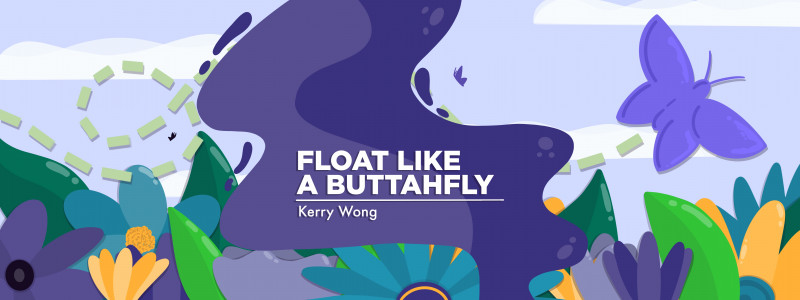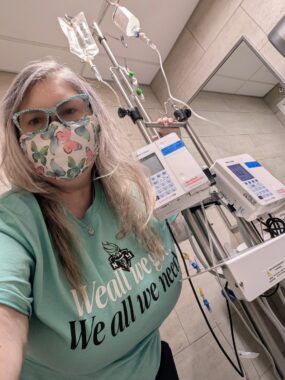With chronic illnesses like sarcoidosis, community is key
There's an instant connection when you find someone who truly 'gets it'
Written by |

Sitting at the infusion center for my intravenous immunoglobulin (IVIG) treatment, I opened up a Google Docs tab on my laptop. I’d just gotten an idea for a column, and wanted to jot down some notes before I forgot it. I had typed exactly eight words when another patient stopped by my cubicle to say she liked my T-shirt (and matching glasses), and we continued talking for at least 15 minutes.
Normally, an interruption like that would make me completely lose the thought I was working on, but this time, it cemented the idea. It was kismet. The eight words I’d typed were the same ones she had admired on my T-shirt:
“We all we got.
We all we need.”
I explained that it’s from a New York Liberty chant, performed call-and-response style to hype up the team and the crowd at every game. We then chatted about other New York City sports, teasingly forgiving each other for choosing the “wrong” baseball team (she follows the Mets, and I’m a die-hard Yankees fan).
Why I like my doctor so much
But then the conversation turned to the reason we were there — well, why I was there, anyway. She asked who my doctor was and how I felt about her. When I said I loved my neurologist, she asked why. As it turns out, her husband recently started seeing the same one, and she’d suggested the same treatment for him.
My immediate response to why I liked this doctor so much was that I’d had so many others before her. Over the years, I’ve had doctors who didn’t believe that anything was wrong with me, doctors who never read the medical records I’d sent over, and doctors who wouldn’t listen to my well-researched suggestions. I’ve had doctors who weren’t familiar with my rare disease, sarcoidosis, so they didn’t recognize its myriad presentations and never even considered it as a diagnosis. I’ve had doctors who barked orders and doctors who were content without definitive answers, despite my needing, wanting, and pleading for them.
On the contrary, this doctor is both knowledgeable and respectful. She has a good understanding of sarcoidosis, how it presents in my nervous system as small fiber neuropathy, and how she can tailor IVIG administration to each patient. She considers my sarcoidosis and neuropathy in connection with my other illnesses, and coordinates with my rheumatologist to manage my treatment.
My neurologist explains everything in detail, from how different symptoms manifest to how different treatments may affect me in both positive and negative ways. She discusses the options with me and offers her advice, but asks how I choose to proceed. She takes time to listen to all of my concerns, even asking about the symptoms I forget to bring up myself.
‘We all we got, we all we need’
The other patient, who was there for reasons unrelated to these questions for her husband, thanked me for sharing my experience, and we continued talking about how much we, as patients and caregivers, can learn from each other. I told her about this column and Bionews’ other rare disease communities, and we talked about finding connection with the chronic illness community.

Kerry Wong got some inspiration from her infusion day T-shirt. (Courtesy of Kerry Wong)
Living with sarcoidosis “can feel so isolating,” I explained.
“Well, it is isolating,” she replied.
She said it so simply, so matter-of-factly — but it felt anything but. She wasn’t speaking for herself, but about what she’s seen in caring for her husband. That level of empathy is so comforting, so encouraging, so validating — and so rare.
Far too often, people with chronic, disabling, and invisible illnesses like sarcoidosis are met with doubt and disdain. Even those with the best intentions can get it wrong, telling us they know what it’s like, while clearly showing that they don’t.
The first time I heard another patient tell a story that sounded like mine was at an Arthritis Foundation event in early 2014, six years into my search for answers. I quickly became overwhelmed with tears — partly out of empathy for her, but also in relief for myself. I couldn’t believe there was someone who knew what I was going through. I wasn’t crazy or exaggerating or making it up for attention. It was real, and she knew it. Eleven years later, I still get emotional thinking about that moment.
That’s why it’s so important for us to find each other wherever we can – through blogs and columns, online and in-person support groups, patient conferences, awareness events, and even infusion centers. When we find another patient or caregiver who truly “gets it,” there is an instant connection. We know we are not alone. We’re in this together.
And just like the New York Liberty, the chronic illness community can also say, “We all we got. We all we need.”
Note: Sarcoidosis News is strictly a news and information website about the disease. It does not provide medical advice, diagnosis, or treatment. This content is not intended to be a substitute for professional medical advice, diagnosis, or treatment. Always seek the advice of your physician or other qualified health provider with any questions you may have regarding a medical condition. Never disregard professional medical advice or delay in seeking it because of something you have read on this website. The opinions expressed in this column are not those of Sarcoidosis News or its parent company, Bionews, and are intended to spark discussion about issues pertaining to sarcoidosis.




Michelle Walker
Kerry, you might be interested in this Patient Advocacy Summit at Notre Dame where my son is speaking about living with sarcoidosis since it is a rare disease.
https://oit.nd.edu/nd-studios/live-events/patient-advocacy-summit/
🦋 Kerry Wong
Oh, how wonderful, Michelle! Thank you for sharing (you must be so proud)!
~🦋